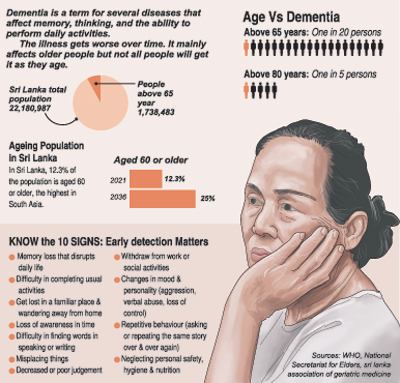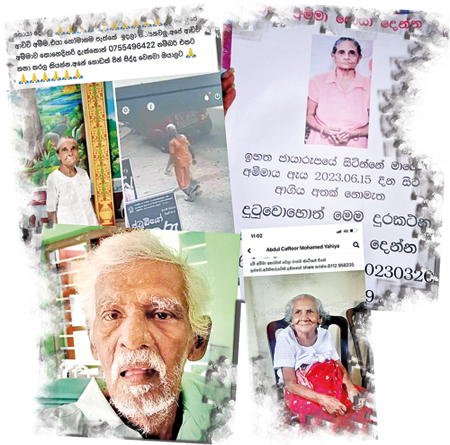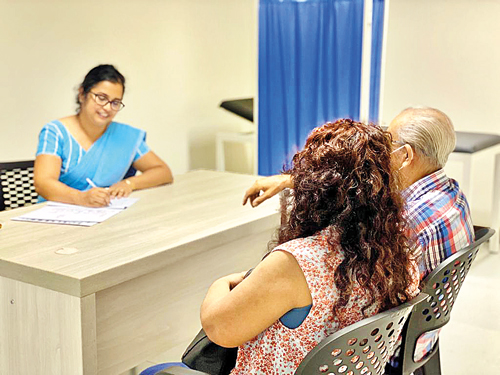News
Dedicated clinics needed at state hospitals to treat dementia in seniors
 Families now rely on social media to search for their elderly parents or grandparents who have wandered far from home.
Families now rely on social media to search for their elderly parents or grandparents who have wandered far from home.
The family of Karunawathie Sandanayake are desperately searching for their 84-year-old loved one who has been missing for over a month.
They reported to police, checked CCTV footage to find her whereabouts, put up posters and visited wards in nearby state hospitals, relatives, temples and ‘meheni aramayas’ but have received zero clues about her.
“My mother-in-law insists on going to the post office to collect her senior citizens’ allowance. She left for the post office, while I took my wife to the hospital clinic. She was not at home when we returned. CCTV footage shows she was walking near the Kalutara Bodhiya by noon,’’ said Lionel Thewarapperuma from Matugama.
He said she had forgotten to take her national identity card as well.
After all search attempts failed, Mrs Karunawathie’s granddaughter resorted to social media. Her posts are being shared and the family are hopeful.
Similarly, at the Ragama train station recently, an elderly woman was seen sitting alone unaware of her whereabouts, or who she was.
“She was dressed well and it looked like she was lost and couldn’t find her way home. Passengers took photos and posted on social media resulting in one of her grandchildren seeing it and rushed to pick her up,” said the station master.
 Dr. S. Suthakaran, senior medical officer of the Vavuniya District Hospital’s psychiatric unit posted a photo of an elderly man on social media, hoping family members will identify him.
Dr. S. Suthakaran, senior medical officer of the Vavuniya District Hospital’s psychiatric unit posted a photo of an elderly man on social media, hoping family members will identify him.
“The patient identified himself as Gunapala then later Gunapala Mendis. Then the surname changed several times. He was unaware of his whereabouts and said he has two sons. Later, he said he has two daughters. He was behaving agitatedly due to memory loss,” Dr. Suthakaran said.
The elderly man was treated and sent to an elder’s home in Vavuniya until a family member is located.
One in 20 persons above 65 years of age and one in five above 80 years is diagnosed with dementia.
However, in Sri Lanka dementia is not widely diagnosed. Therefore the exact numbers of those with dementia among the elderly are unknown.
According to the National Secretariat of Elders, there are 997,547 Sri Lankans between the ages of 60 and 64 and 1.7 million people above 65 years of age in the country.
Consultant psychiatrist at the National Hospital, Colombo Dr. Anuprabha Wickramasinghe told the Sunday Times that although dementia is incurable, there are treatments to limit the progression and slow down the deterioration.
“It starts with forgetfulness, such as forgetting to turn off the tap or cooker, forgetting appointments, asking repetitive questions, misplacing things or reducing standards of personal care. These changes can be accompanied by mood changes ranging from being depressed to anxious or irritable, poor motivation, and difficulty in completing usual tasks,” she said.
Dr. Wickramasinghe said wandering from home can happen due to the reduced awareness about their whereabouts, which happens with advancing dementia.
However, a person may get lost in unfamiliar places even in early stages of this illness, she said.
Alzheimer’s disease is the commonest form of dementia (60%). Short term memory loss is one of the earliest signs of Alzheimer’s.

A cognitive test being conducted on an elderly person
Dr. Wickramasinghe said with the growing elderly population, the importance of establishing dedicated clinics for the older adults at state hospitals is now arising, so families with elderly persons with dementia can seek medical treatment and guidance.
“The affected person is usually not aware about the extent of the memory problems and families/friends should be vigilant about early signs and seek help. It is important for the affected persons to live an active and independent life as long as possible, although with time they might need more supervision. Caring for an affected person will require a collective effort from family members and the services,” she said.
President of Sri Lanka Association of Geriatric Medicine, Prof. Kamani Wanigasuriya said the increased number of young people going overseas for jobs and migrating will trigger the need for institutionalised care for elderly suffering from dementia and for professional caregivers.
“The country is recording the highest number of elders in the Southeast Asian region. The economic crisis and cost of living is pushing family members who were carers of their elderly parents to seek jobs. Insufficient care givers and institutionalised care will be a grave problem if not addressed,” she said.
“Elderly care will be in high demand in the coming years.’’
Director of state-run National Secretariat of Elders, K.G.Lanerolle said there are about 150 day centres run by elders’ societies in villages, mainly to ensure elders whose family members are out to work have a place to stay and be occupied during the day time.
The secretariat has recently signed an agreement with the National Apprentice and Industrial Training Authority to train 1,000 students this year to be elder care givers with a NVQ qualification awarded.
“We know most of them will target overseas jobs, therefore an agreement will be signed with applicants to initially work within the country,” he said.
He said dementia awareness programmes are being prepared and will be conducted island-wide.
The best way to say that you found the home of your dreams is by finding it on Hitad.lk. We have listings for apartments for sale or rent in Sri Lanka, no matter what locale you're looking for! Whether you live in Colombo, Galle, Kandy, Matara, Jaffna and more - we've got them all!

